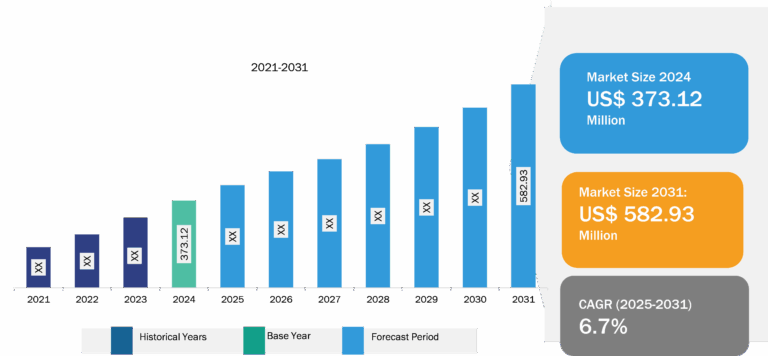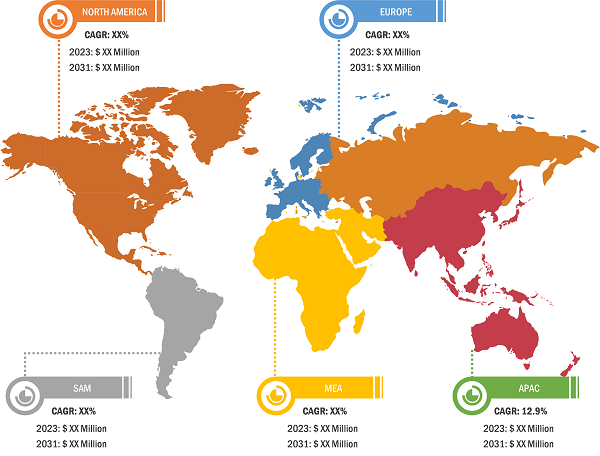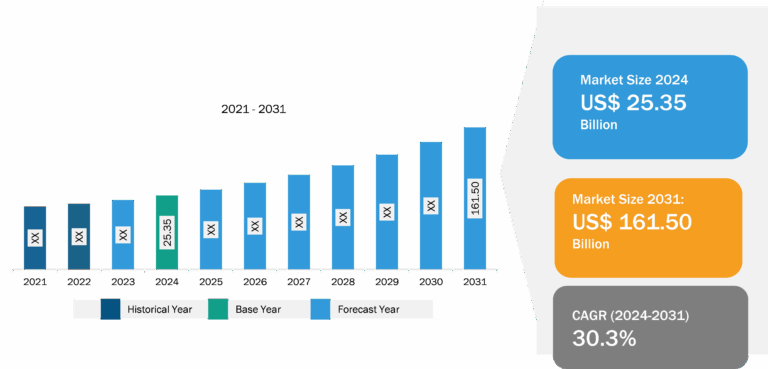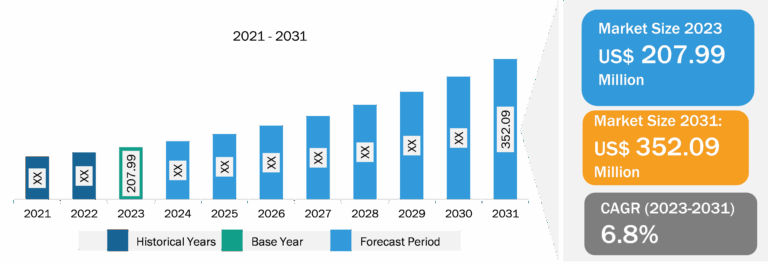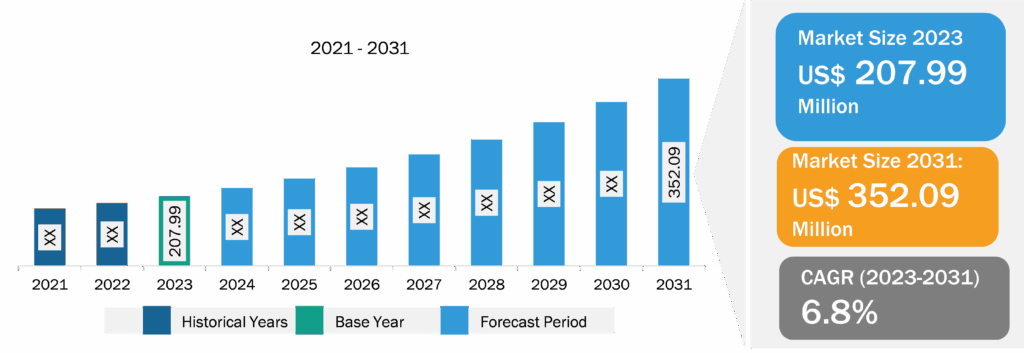
Hall Effect Teslameter Market
According to a new comprehensive report from The Insight Partners, the hall effect teslameter market is observing significant growth owing to the increasing demand for electric vehicles and rising demand for hall effect teslameters in scientific research.
The report runs an in-depth analysis of market trends, key players, and future opportunities. In general, the hall effect teslameter market is segmented on the basis of type and end users, which are expected to register significant growth in the coming years.

Overview of Report Findings
- Market Growth: The hall effect teslameter market was valued at US$ 207.99 million in 2023 and is projected to reach US$ 352.09 million by 2031; it is expected to register a CAGR of 6.8% during 2023–2031. The growing demand for precision in applications such as electric vehicles (EVs), renewable energy systems (wind turbines), and semiconductor production is increasingly adopting advanced magnetic measurement solutions. The robust focus on industrial automation and robotics necessitates the use of hall effect teslameters to assure the efficiency and safety of production lines and machines. Furthermore, the rising emphasis on electric mobility and the incorporation of smart technology into EVs increase the demand for hall effect teslameters. This equipment is used to monitor the magnetic characteristics of components such as motors and battery packs. Therefore, governments of various countries are implementing favorable initiatives related to energy efficiency and emissions, which drive the demand for hall effect teslameters in the industrial and other sectors, boosting the market growth.
- Medical Imaging Technologies: The healthcare sector provides significant prospects for hall effect teslameters, particularly in medical imaging technologies such as MRI. As the demand for improved imaging techniques increases, the requirement for precise magnetic field measurement equipment to assure the devices’ safety and performance also grows. Teslameters serve an important role in the functioning and effectiveness of magnetic resonance imaging (MRI) devices. These devices are used to assess the strength and homogeneity of magnetic fields produced by MRI machines, which are required to produce high-quality images of the body’s internal components. Hall effect teslameters can help detect inhomogeneities, contributing to the imaging process’s integrity by ensuring that the magnetic field remains consistent, resulting in better and more precise images of anatomical structures.
- Industrial Automation: The digital industrial revolution, i.e., Industry 4.0, aims to increase flexibility in manufacturing, provide mass customization, improve quality, and enhance productivity in factories. According to the International Trade Administration, by 2025, 84% of German manufacturers are planning to invest US$ 10.52 billion (EUR 10 billion) annually into smart manufacturing technologies. Hall effect teslameter helps in measuring magnetic fields in various industrial applications and offers advanced measurement solutions that cater to the needs of automated environments. In addition, as automation necessitates continuous monitoring of various parameters to optimize production operations, the demand for hall effect teslameters will further increase as it provides crucial data on magnetic fields, allowing industries to optimize operations for optimal efficiency and production.
Market Segmentation
- Based on type, the hall effect teslameter market is bifurcated into analog hall effect teslameters and digital hall effect teslameters. The digital hall effect teslameters segment dominated the market in 2023.
- In terms of end users, the hall effect teslameter market is segmented into automotive, industrial, healthcare, aerospace, laboratory, and others. The automotive segment dominated the market in 2023.
Competitive Strategy and Development
- Key Players: Major companies operating in the hall effect teslameter market are PCE Instruments UK Ltd; OMEGA Engineering, Inc.; Coliy Group; Senis AG; Hirst Magnetic Instruments; Dr. Brockhaus Messtechnik GmbH & Co. KG; Calamit S.r.l; Maurer Magnetic AG; Magnaflux; Lake Shore Cryotronics, Inc.; AlphaLab, Inc.; TUNKIA Co., Ltd.; XIAMEN DEXING MAGNET TECH. CO., LTD.; Magnetic Instrumentation; and MAGNET-PHYSIK Dr. Steingroever GmbH.
- Trending Topics: Magnetic sensing chips market, magnetic proximity sensor market, and magnetic particle imaging market, among others.
Global Headlines on Hall Effect Teslameter
- Lake Shore Cryotronics, a Westerville, Ohio-based manufacturer of sensors, scientific instruments, and systems for cryogenic and magnetic applications, announced a significant expansion of its Westerville facility, investing nearly US$ 14 million into the location.
- PCE Instruments opened a new branch in Bulgaria to further develop software, hardware and embedded software.
Conclusion
Europe is a global leader in adopting green technologies. The region is making significant investments in solar power, wind energy, and electric vehicles (EVs), which increases the demand for hall effect teslameters. These devices are critical in measuring the magnetic fields in EV motors and wind turbine generators, ensuring optimal performance and efficiency. Similarly, the European Union is implementing stringent environmental measures, such as the Green Deal, to reduce carbon emissions and encourage energy efficiency, which increases the demand for hall effect teslameters for measuring magnetic fields precisely.
The expansion of the automotive and electronics sectors is creating a demand for hall effect teslameters in APAC. China, India, Japan, and South Korea are major regional market contributors, with high demand for hall effect teslameters for reliable magnetic field measurement in automotive, semiconductor, consumer electronics, and industrial machinery manufacturing. Furthermore, the automobile industry in Asia Pacific is dominated by China and India. These countries are transitioning their electric mobility and adopting eco-friendly solutions. The growing production of EVs and their components, such as motors, battery packs, and power electronics, surges the adoption of hall effect teslameters for monitoring magnetic fields within these systems.
The report from The Insight Partners, therefore, provides several stakeholders—including component providers, product manufacturers, and end users—with valuable insights into how to successfully navigate this evolving market landscape and unlock new opportunities.

